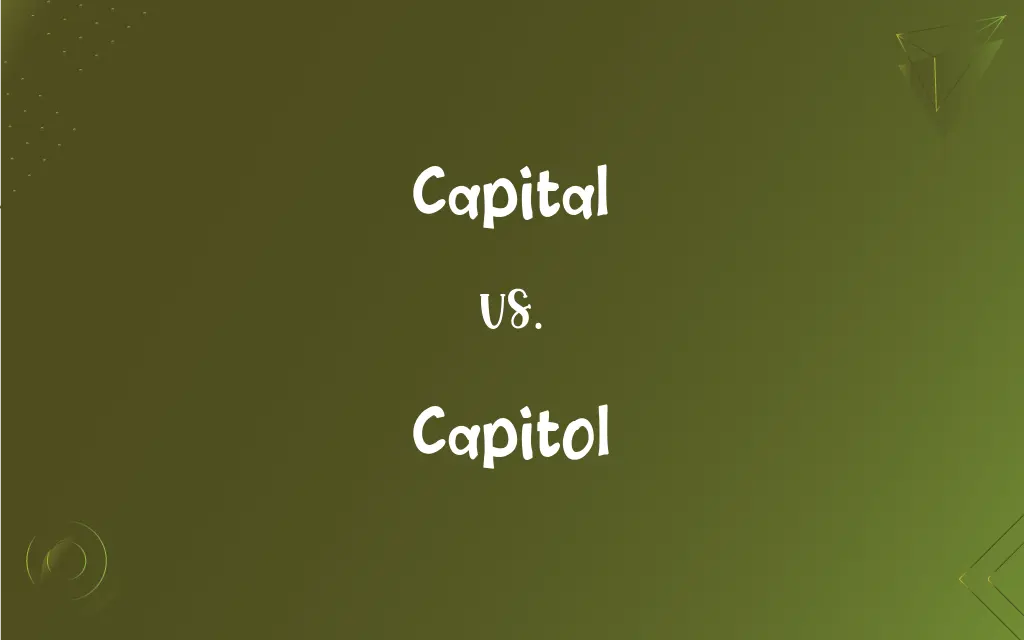Capital vs. Capitol: What's the Difference?
Edited by Janet White || By Harlon Moss || Updated on October 19, 2023
Capital refers to a city, wealth, or letter type; capitol refers to a building where legislative work occurs.

Key Differences
Capital typically refers to a significant city, especially one that serves as the seat of a country's or state's government. Capitol, on the other hand, specifically denotes a building where a legislature convenes.
In economics, capital can mean money or assets used in the production of goods and services. Capitol, in contrast, does not have an economic connotation but is strictly associated with the domain of governance.
In grammar, capital denotes an uppercase letter, as in the beginning of a sentence or a proper noun. Capitol, irrespective of its case, always refers to the legislative building.
Geographically, when people mention a nation's or state's capital, they are talking about its primary city. When they mention the capitol, they're pinpointing where the legislature meets within that city.
To reiterate, while capital can refer to a city, finance, or an uppercase letter, capitol singularly refers to a building where lawmakers gather to conduct state or national business.
ADVERTISEMENT
Comparison Chart
Definition
Refers to a city, finance, or an uppercase letter.
Refers to a legislative building.
Usage
"Paris is the capital of France."
"The U.S. Capitol is in Washington, D.C."
Domain
Can be geographic, economic, or grammatical.
Strictly related to governance.
Examples
"She invested her capital wisely."
"The capitol has a distinctive dome."
Grammar
Can be an adjective, as in "capital letter".
Always a noun referring to a specific building type.
ADVERTISEMENT
Capital and Capitol Definitions
Capital
Capital describes an uppercase letter.
The name John starts with a capital J.
Capitol
Capitol is a building where a legislative body meets.
The Capitol in Washington, D.C. is iconic.
Capital
Capital refers to money or wealth used in investment or business.
They raised enough capital to start their own company.
Capitol
Capitol is a symbol of governmental power.
Decisions made in the capitol affect the whole nation.
Capital
Capital is a main city of a state or country.
London is the capital of England.
Capitol
Capitol buildings can be tourist destinations.
Visitors often tour the state capitol.
Capital
Capital can mean primary or of the greatest importance.
This is of capital importance to our mission.
Capitol
Capitol can refer to a particular architectural structure.
The dome of the capitol is quite famous.
Capital
Capital refers to death as a legally sanctioned punishment.
Capital punishment remains controversial.
Capitol
Capitols often have historical importance.
The capitol has been the backdrop for many significant events.
Capital
A town or city that is the official seat of government in a political entity, such as a state or nation.
Capitol
A building or complex of buildings in which a state legislature meets.
Capital
A city that is the center of a specific activity or industry
The financial capital of the world.
Capitol
Capitol The building in Washington, DC, where the Congress of the United States meets. See Usage Note at capital1.
FAQs
Is a capitol always related to government?
Yes, a capitol is a building where legislative activities occur.
Can capital refer to an uppercase letter?
Yes, a capital letter is an uppercase letter.
Does every state have its own capitol?
Yes, in the U.S., every state has its own capitol building.
What's the primary difference between capital and capitol?
Capital can refer to a city, finance, or letter type; capitol refers to a legislative building.
Is the dome on the U.S. Capitol unique?
Yes, the U.S. Capitol's dome is distinct and iconic.
What's the capital of the U.S.?
The capital city of the U.S. is Washington, D.C.
Where can I find the U.S. Capitol?
The U.S. Capitol is located in Washington, D.C.
Are all decisions about money made in the capitol?
No, not all financial decisions are made in the capitol; it's for legislative matters.
Are all capitol buildings architecturally significant?
While many are significant, not all capitol buildings are architecturally renowned.
Can the word capital be used in economics?
Yes, in economics, capital refers to assets or wealth.
Can I use capital and capitol interchangeably?
No, they have distinct meanings and aren't interchangeable.
Is capital punishment related to the city definition?
No, capital punishment refers to the death penalty, unrelated to the city definition.
Is the spelling "capital" ever correct for the legislative building?
No, the legislative building is always spelled "capitol."
Can a city be a capital without having a capitol?
Yes, being a capital refers to its status, not necessarily having a capitol building.
Are all capitals major tourist destinations?
Not necessarily, though many capitals are popular tourist spots.
Do capitals always represent the most populous city in a state or country?
No, capitals are administrative centers, not necessarily the most populous.
Do all countries have a national capitol?
Most countries have a central legislative building, often called a capitol or equivalent.
What's the origin of the word capitol?
"Capitol" is derived from the Latin "Capitolium," a temple in ancient Rome.
Is capital always about money?
No, capital can also refer to a significant city or an uppercase letter.
In grammar, does capital refer to starting a sentence?
Yes, sentences typically begin with a capital, or uppercase, letter.
About Author
Written by
Harlon MossHarlon is a seasoned quality moderator and accomplished content writer for Difference Wiki. An alumnus of the prestigious University of California, he earned his degree in Computer Science. Leveraging his academic background, Harlon brings a meticulous and informed perspective to his work, ensuring content accuracy and excellence.
Edited by
Janet WhiteJanet White has been an esteemed writer and blogger for Difference Wiki. Holding a Master's degree in Science and Medical Journalism from the prestigious Boston University, she has consistently demonstrated her expertise and passion for her field. When she's not immersed in her work, Janet relishes her time exercising, delving into a good book, and cherishing moments with friends and family.
































































